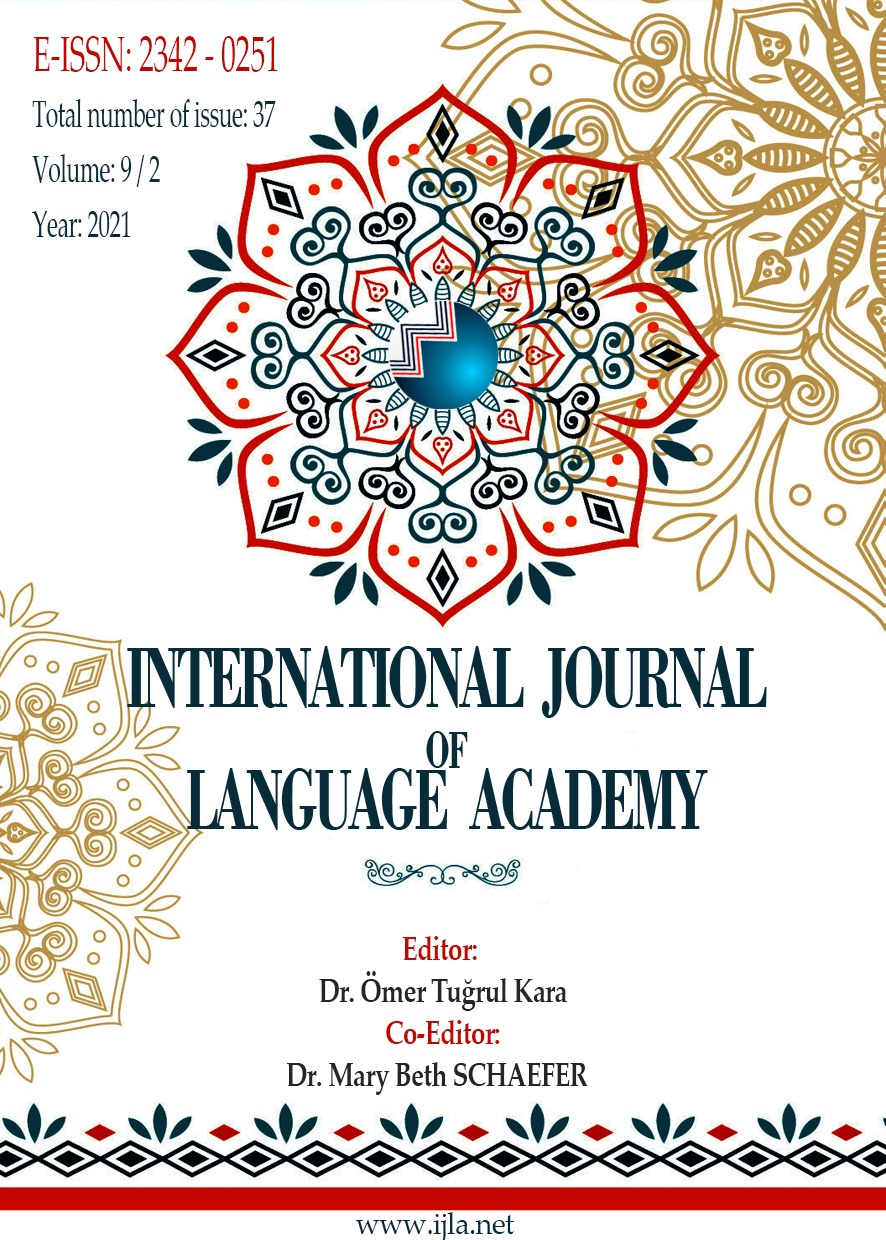TÜRKÇE ÖĞRETMENLERİNİN DOĞU ANADOLU BÖLGESİNDE YAŞADIKLARI SORUNLAR ÜZERİNE FENOMENOLOJİK BİR ÇALIŞMA
Author :
Abstract
Bu çalışmanın amacı Doğu Anadolu Bölgesinde görev yapan Türkçe öğretmenlerinin karşılaştıkları sorunları Türkçe eğitimi çerçevesinde incelemektir. Belirtilen amaç doğrultusunda nitel yöntemlerden fenomenolojik araştırma deseni kullanılmıştır. Araştırmanın katılımcılarını Doğu Anadolu Bölgesinin farklı bölümlerinde görev yapan 17 Türkçe öğretmeni oluşturmaktadır. Araştırmaya katılım gösteren öğretmenlerin özellikleri %35,3 erkek, %64,7 kadın; %41,2 köyde, %58,8’i ilçede görev yapan; 1-5 yıl arası kıdeme sahip 52,9, 6-10 yıl arası kıdeme sahip 23,5, 11-15 yıl arası kıdeme sahip 17,6 ve 16-20 yıl arası kıdeme sahip %5,9 olarak belirlenmiştir. Katılımcıların görüşlerini tespit etmek için uzman görüşleri doğrultusunda şekillendirilmiş altı sorudan oluşan yarı-yapılandırılmış görüşme formu kullanılmıştır. Elde edilen bulgular içerik analizine tabi tutularak irdelenmiş ve kategoriler halinde sunulmuştur. Araştırma sonucunda elde edilen bulgular neticesinde; Doğu Anadolu Bölgesinde görev yapan Türkçe öğretmenlerinin bu mesleği seçme sürecinde; Türk diline ilgi duymaları ve Türkçe öğretmenlerini rol model almaları gibi faktörlerin etkili olduğu söylenebilir. Bölge bağlamındaki deneyimler açısından ise; yöresel ağız kullanımı ve Türkçeye gereken önemin verilmemesi katılımcıların başlıca katılımcı izlenimleri arasında yer almaktadır. Ayrıca çalışma kapsamında; Türkçe öğretmenlerinin derslerinde yöntem bağlamında sunuş yolu stratejisini, soru-cevap, altı şapkalı düşünme ve gösteri yöntem-tekniklerini kullandıkları belirlenmiştir. Katılımcıların karşılaştıkları sorunlara yönelik çözüm önerileri ve mesleki gelişim çalışmaları da tablolar halinde sunulmuştur. Çalışmaya katılım gösteren Türkçe öğretmenlerinin görüşleri çerçevesinde, Doğu Anadolu Bölgesinde görev yapmanın avantajlarından çok dezavantajlarını belirttikleri görülmektedir.
Keywords
Abstract
This study examines the problems encountered by Turkish teachers working in the Eastern Anatolia Region throughout the region and especially for Turkish education. For this purpose, phenomenological study, which is one of the qualitative methods, was preferred. The participants of the study consist of 17 Turkish teachers who served in different parts of the Eastern Anatolian Region. In order to determine the opinions of the participants, a semi-structured interview form consisting of six questions shaped in line with expert opinions was used. The obtained findings were analyzed by content analysis and presented in categories. Therefore, it can be said that factors such as their interest in Turkish and their role modeling on Turkish teachers are influential in the process of choosing this profession by the Turkish teachers working in the Eastern Anatolia Region. In terms of experiences in the context of the region, the use of the local dialect and not paying enough attention to Turkish use were among Participants' first impressions. Also, within the scope of the research, presentation strategies of Turkish teachers in their lessons, it was observed that they used question-answer, thinking, and demonstration methods-techniques in the context of methods and techniques. Solution suggestions and professional development studies for the problems faced by the participants are also presented in tables. It is seen that they stated the disadvantages rather than the advantages of working in the Eastern Anatolia Region. Participant views on the possible suggestions for the identified disadvantages were categorized by student, family, and region and presented in categories.
Keywords
- Akturan, U. ve Esen, A. (2008). Fenomenoloji. Nitel araştırma yöntemleri. Ankara: Seçkin Yayıncılık.
- Altunişik, R., Coşkun, R., Bayraktaroğlu, S. ve Yıldırım, E. (2010). Sosyal bilimlerde araştırma yöntemleri SPSS uygulamalı.Sakarya: Sakarya Yayıncılık.
- Asal, M. (25.12.2018). Okulun fiziki imkânlarının eğitim hayatındaki önemi nedir?,Edubien. http://www.edubien.com/okulun-fiziki-imkanlarinin-egitimhayatindaki-onemi-nedir/sitesinden 27.03.2021 tarihinde erişilmiştir.
- Ashton, P. T. ve Webb, R. B. (1986). Making a difference: Teachers’ sense of efficacyandstudentachievement. New York: Longman.
- Aydoğan, İ. (2012). Okul binalarının özellikleri ve öğrenciler üzerine etkileri. Millî Eğitim Dergisi, 42(193), 29-43.
- Ayyıldız, M., Bozkurt, Ü. ve Canlı, S. (2006). Okuma kültürü üzerine bir araştırma. Millî Eğitim Dergisi, 34(169).
- Bilgin, N. (2014). Sosyal bilimlerde içerik analizi teknikler ve örnek çalışmalar. Ankara: Siyasal Kitabevi.
- Çelik, S., Toraman, S. Ö. ve Çelik, K. (2018). Therelation of studentachievementwithcourseattendanceandteacherimmediacy. Kastamonu EducationJournal, 26(1), 209-217.
- Çelikten, M. (2005). Öğretmenlik mesleği ve özellikleri. Erciyes Üniversitesi Sosyal Bilimler Enstitüsü Dergisi, 1(19), 207-237.
- Demirel, Ö. ve Budak, Y. (2003). Öğretmenlerin hizmet-içi eğitim ihtiyacı. Kuram ve Uygulamada Eğitim Yönetimi, 33(33), 62-81.
- Daresh, J. C. (2002). Teachersmentoringteachers. California: CorwinPress.
- Erol, O. (1993). Türkiye’nin doğal yöre ve çevreleri, Ege Coğrafya Dergisi, 7, 13-41.
- Fidan, N. (2012). Okulda öğrenme ve öğretme. Ankara:Pegem Akademi Yayıncılık.
- Göçer, A. (2009). Türkçe eğitiminde öğrencilerin söz varlığını geliştirme teknikleri ve sözlük kullanımı. Electronic TurkishStudies. 4(4), 1007-1036. DOI :http://dx.doi.org/10.7827/TurkishStudies.1318.
- Karadağ, R. (2012). Türkçe öğretmeni adaylarının öğretmenlik mesleğine ilişkin tutumları ve öğretmenlik mesleğini tercih nedenleri. HumanitiesSciences, 7(2), 44-66.
- Karip, E. (2017). Türkiye’nin TIMSS 2015 performansı üzerine değerlendirme ve öneriler (Tedmem Analiz Dizisi), Ankara: Türk Eğitim Derneği Yayınları.
- Kozikoğlu, İ. ve Senemoğlu, N. (2018). Mesleğe yeni başlayan öğretmenlerin karşılaştıkları güçlükler: Nitel bir çözümleme. Eğitimde Nitel Araştırmalar Dergisi, 6(3), 341-371.
- Kılıç, S. (2013). Örnekleme yöntemleri. Journal of MoodDisorders, 3(1), 44-6.
- Milli Eğitim Bakanlığı, Temel eğitime destek projesi “öğretmen eğitimi bileşeni (2006). Öğretmenlik mesleki genel yeterlilikleri. Erişim adresi: http://oygm.meb.gov.tr/meb-iys-dosyalar/2017-12/13161921_öğretmenlik mesleğigenelyeterlilikleri_onaylanan.pdf
- Millî Eğitim Bakanlığı, Yenilik ve Eğitim Teknolojileri Genel Müdürlüğü. (2019). 2019- 2023 Eğitim Stratejisi Belgesi. Erişim adresi: http://sgb.meb.gov.tr/www/2019-2023stratejikplani-genelgesiyayinlanmistir/icerik/259
- Miles, M. B. ve Huberman, A. M. (1994). Qualitativedataanalysis an expandedsourcebook. California: Sage Publications.
- Özdemir, M. (2010). Nitel veri analizi: Sosyal bilimlerde yöntembilim sorunsalı üzerine bir çalışma. Eskişehir Osmangazi Üniversitesi Sosyal Bilimler Dergisi, 11(1),323-343. Retrievedfromhttps://dergipark.org.tr/tr/pub/ogusbd/issue/10997/131612
- Sarıkaya, B. (2019). Kırsal kesimde görev yapan Türkçe öğretmenlerinin Türkçe eğitiminde karşılaştıkları sorunlar ve çözüm önerileri (Muş ili örneği). Yüzüncü Yıl Üniversitesi Sosyal Bilimler Ensitüsü Dergisi, (43), 151-171.
- Seferoğlu, S. S. (2004). Öğretmen yeterlilikleri ve mesleki gelişim. Bilim ve Aklın Aydınlığında Eğitim, 58, 40-45.
- Yıldırım, A. ve Şimşek, H. (2008). Sosyal bilimlerde nitel araştırma yöntemleri (6. Baskı).Ankara: Seçkin Yayıncılık.
- Yıldırım, A. ve Şimşek, H. (2011). Sosyal bilimlerde nitel araştırma yöntemleri (8th ed.). Ankara: Seçkin Yayınevi.





